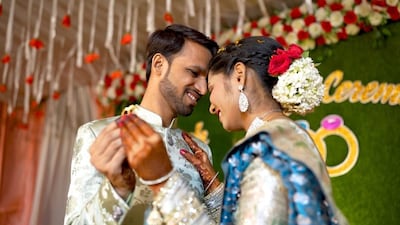More than 36,000 weddings involving non-Emiratis have been carried out at the Abu Dhabi Civil Family Court since it opened in late 2021, with many couples requesting to tie the knot on Friday – Valentine's Day.
The court has processed an average of 70 weddings a day, about 12 applications an hour. Officials are expecting Friday to be even busier than Valentine's Day last year, when 143 marriages took place at the civil court.
One who will be getting married on Friday is Diksha Dilip Sahare, 30, a nurse from India, who is marrying her fiance Hitesh Ashok Patil at the court.
“Ever since I was a child, I always said that I was going to get married on Valentine’s," she said. "Every Valentine’s my friends would joke if this would be the day I would get married.
"I just think it is the most romantic thing in the world and when I got engaged, that was one of my conditions – that we get married on Valentine’s Day. Hitesh has fulfilled my dream."
She is only one of many people in the UAE hoping to get married on what is widely regarded as the most romantic day of the year, according to one expert.
"Around Valentine's Day, we observe a significant increase in couples eager to marry on the symbolic date of February 14," said Florian Ughetto, manager of Easy Wedding, who founded the company with his wife after facing difficulties finding someone to help organise their own wedding.
Growing demand
The increased interest in getting married at the Abu Dhabi Civil Family Court is a reflection on the emirate's status as an attractive location for couples, both based here and from afar, seeking a civil wedding, said a senior official.
"This approach demonstrates Abu Dhabi’s commitment to accommodating individuals from different nationalities and cultures, while enhancing its competitiveness and appeal in attracting top talent and skilled professionals," said Yousef Al Abri, undersecretary of the Judicial Department.
"This is reinforced by modern laws that uphold cultural diversity and foster a well-structured, inclusive legal environment tailored to the needs of foreign residents."
The court in Abu Dhabi has already captured the imagination of couples from across the world, including celebrities. Lebanese actress Sara Abi Kanaan married her actor husband Wissam Fares at the venue last year.
The court was established in 2021 to hear all cases governed under a non-Sharia process. The court was launched with the aim of bringing the emirate into line with international legal practices.
Change of approach
The increase in demand for civil weddings in Abu Dhabi reflects wide-scale changes in how couples, both in the region and from further afield, approach married life, according to a leading lawyer in the sector.
Shabana Saleem, senior associate family barrister, said she has noted a 30 per cent rise in enquiries over the past two weeks, including specific requests for a civil marriage appointment on Valentine’s Day, and also from couples looking for information on pre-nuptial and post-nuptial. While pre-nuptial agreements where couples agree on financial and other terms before marriage are well documented, the post-nuptial agreement is less common.
As the name suggests, it is a contract agreed on after the wedding has taken place, when both spouses agree on financial terms in the event of a divorce. While both pre-nuptial and post-nuptial agreements are not new concepts, they were less associated with the Middle East region than other parts of the world. However that is changing, Ms Saleem says.
"In the last week alone, I’ve had significant inquiries from couples getting married within the next 14 days," she said. "Pre-nups or marriage agreements are no longer about protecting wealth, they’re about safeguarding the emotional and financial well-being of both partners.
“The heart of a pre-nup is essentially to give a couple the chance to have candid discussions about critical issues such as finances, children and the path forward if there is a divorce,” she said. "This becomes particularly important for expat families who face added layers of uncertainty.”
Weddings at Abu Dhabi Civil Family Court
The National's picks
4.35pm: Tilal Al Khalediah
5.10pm: Continous
5.45pm: Raging Torrent
6.20pm: West Acre
7pm: Flood Zone
7.40pm: Straight No Chaser
8.15pm: Romantic Warrior
8.50pm: Calandogan
9.30pm: Forever Young
COMPANY PROFILE
Initial investment: Undisclosed
Investment stage: Series A
Investors: Core42
Current number of staff: 47
More from Rashmee Roshan Lall
In numbers: China in Dubai
The number of Chinese people living in Dubai: An estimated 200,000
Number of Chinese people in International City: Almost 50,000
Daily visitors to Dragon Mart in 2018/19: 120,000
Daily visitors to Dragon Mart in 2010: 20,000
Percentage increase in visitors in eight years: 500 per cent
The specS: 2018 Toyota Camry
Price: base / as tested: Dh91,000 / Dh114,000
Engine: 3.5-litre V6
Gearbox: Eight-speed automatic
Power: 298hp @ 6,600rpm
Torque: 356Nm @ 4,700rpm
Fuel economy, combined: 7.0L / 100km
SPEC%20SHEET%3A%20APPLE%20M3%20MACBOOK%20AIR%20(13%22)
%3Cp%3E%3Cstrong%3EProcessor%3A%3C%2Fstrong%3E%20Apple%20M3%2C%208-core%20CPU%2C%20up%20to%2010-core%20CPU%2C%2016-core%20Neural%20Engine%3C%2Fp%3E%0A%3Cp%3E%3Cstrong%3EDisplay%3A%3C%2Fstrong%3E%2013.6-inch%20Liquid%20Retina%2C%202560%20x%201664%2C%20224ppi%2C%20500%20nits%2C%20True%20Tone%2C%20wide%20colour%3C%2Fp%3E%0A%3Cp%3E%3Cstrong%3EMemory%3A%3C%2Fstrong%3E%208%2F16%2F24GB%3C%2Fp%3E%0A%3Cp%3E%3Cstrong%3EStorage%3A%3C%2Fstrong%3E%20256%2F512GB%20%2F%201%2F2TB%3C%2Fp%3E%0A%3Cp%3E%3Cstrong%3EI%2FO%3A%3C%2Fstrong%3E%20Thunderbolt%203%2FUSB-4%20(2)%2C%203.5mm%20audio%2C%20Touch%20ID%3C%2Fp%3E%0A%3Cp%3E%3Cstrong%3EConnectivity%3A%3C%2Fstrong%3E%20Wi-Fi%206E%2C%20Bluetooth%205.3%3C%2Fp%3E%0A%3Cp%3E%3Cstrong%3EBattery%3A%3C%2Fstrong%3E%2052.6Wh%20lithium-polymer%2C%20up%20to%2018%20hours%2C%20MagSafe%20charging%3C%2Fp%3E%0A%3Cp%3E%3Cstrong%3ECamera%3A%3C%2Fstrong%3E%201080p%20FaceTime%20HD%3C%2Fp%3E%0A%3Cp%3E%3Cstrong%3EVideo%3A%3C%2Fstrong%3E%20Support%20for%20Apple%20ProRes%2C%20HDR%20with%20Dolby%20Vision%2C%20HDR10%3C%2Fp%3E%0A%3Cp%3E%3Cstrong%3EAudio%3A%3C%2Fstrong%3E%204-speaker%20system%2C%20wide%20stereo%2C%20support%20for%20Dolby%20Atmos%2C%20Spatial%20Audio%20and%20dynamic%20head%20tracking%20(with%20AirPods)%3C%2Fp%3E%0A%3Cp%3E%3Cstrong%3EColours%3A%3C%2Fstrong%3E%20Midnight%2C%20silver%2C%20space%20grey%2C%20starlight%3C%2Fp%3E%0A%3Cp%3E%3Cstrong%3EIn%20the%20box%3A%3C%2Fstrong%3E%20MacBook%20Air%2C%2030W%2F35W%20dual-port%2F70w%20power%20adapter%2C%20USB-C-to-MagSafe%20cable%2C%202%20Apple%20stickers%3C%2Fp%3E%0A%3Cp%3E%3Cstrong%3EPrice%3A%3C%2Fstrong%3E%20From%20Dh4%2C599%3C%2Fp%3E%0A
CHATGPT%20ENTERPRISE%20FEATURES
%3Cp%3E%E2%80%A2%20Enterprise-grade%20security%20and%20privacy%3C%2Fp%3E%0A%3Cp%3E%E2%80%A2%20Unlimited%20higher-speed%20GPT-4%20access%20with%20no%20caps%3C%2Fp%3E%0A%3Cp%3E%E2%80%A2%20Longer%20context%20windows%20for%20processing%20longer%20inputs%3C%2Fp%3E%0A%3Cp%3E%E2%80%A2%20Advanced%20data%20analysis%20capabilities%3C%2Fp%3E%0A%3Cp%3E%E2%80%A2%20Customisation%20options%3C%2Fp%3E%0A%3Cp%3E%E2%80%A2%20Shareable%20chat%20templates%20that%20companies%20can%20use%20to%20collaborate%20and%20build%20common%20workflows%3C%2Fp%3E%0A%3Cp%3E%E2%80%A2%20Analytics%20dashboard%20for%20usage%20insights%3C%2Fp%3E%0A%3Cp%3E%E2%80%A2%20Free%20credits%20to%20use%20OpenAI%20APIs%20to%20extend%20OpenAI%20into%20a%20fully-custom%20solution%20for%20enterprises%3C%2Fp%3E%0A
MATCH INFO
Leeds United 0
Brighton 1 (Maupay 17')
Man of the match: Ben White (Brighton)
About Tenderd
Started: May 2018
Founder: Arjun Mohan
Based: Dubai
Size: 23 employees
Funding: Raised $5.8m in a seed fund round in December 2018. Backers include Y Combinator, Beco Capital, Venturesouq, Paul Graham, Peter Thiel, Paul Buchheit, Justin Mateen, Matt Mickiewicz, SOMA, Dynamo and Global Founders Capital
The%20Genius%20of%20Their%20Age
%3Cp%3EAuthor%3A%20S%20Frederick%20Starr%3Cbr%3EPublisher%3A%20Oxford%20University%20Press%3Cbr%3EPages%3A%20290%3Cbr%3EAvailable%3A%20January%2024%3C%2Fp%3E%0A
Infiniti QX80 specs
Engine: twin-turbocharged 3.5-liter V6
Power: 450hp
Torque: 700Nm
Price: From Dh450,000, Autograph model from Dh510,000
Available: Now
A Bad Moms Christmas
Dir: John Lucas and Scott Moore
Starring: Mila Kunis, Kathryn Hahn, Kristen Bell, Susan Sarandon, Christine Baranski, Cheryl Hines
Two stars
EA Sports FC 26
Publisher: EA Sports
Consoles: PC, PlayStation 4/5, Xbox Series X/S
Rating: 3/5
THE SPECS
Engine: 3.5-litre supercharged V6
Power: 416hp at 7,000rpm
Torque: 410Nm at 3,500rpm
Transmission: 6-speed manual
Fuel consumption: 10.2 l/100km
Price: Dh375,000
On sale: now



